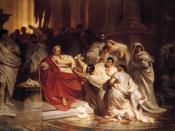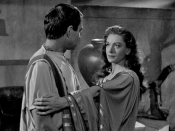In this speech Mark Antony argues that Julius Caesar was dishonourably murdered by Brutus and his accomplices. He argues for the crowd to see through Brutus' apparent integrity and for the crowd to hold him to account for his crime in assassinating the once much respected leader. He does this by forming an emotional relationship with the crowd and engineering a deep level of trust. He subtly sows seeds of discontent in the crowd and uses physical actions and gesture in preference to employing any direct accusation. He leads the crowd by modelling an emotional response for them to emulate. Antony delivers a context for the plebeians to believe that they are coming to their own conclusions in doubting Brutus. He empowers the crowd and invites them to see things as he does by using their own imagination and examining the evidence for themselves. Antony delivers a very influential oration and defuses potential resistance to his discourse by claiming that he is no great orator: he is simply telling them what they already know.
This contrasts sharply with Brutus who patronisingly orders them to believe what he wants them to believe. Antony employs refined tools of communication far beyond purely verbal interchange. He employs the visual sense, emotional faculties and imagination whilst all the while seeming to adhere strictly to the conditions accepted by him in return for the opportunity to speak at the funeral. Antony motivates a rebellion to seek revenge for the assassination by employing the dual action of drawing the crowd ever closer to the reality of the murdered Caesar whilst concurrently albeit indirectly, offering reasons to distrust Brutus.
The speech has the effect of bringing in to realisation the rift, hinted at in the opening scene, between the ordinary citizens and the leadership of Rome. It...


